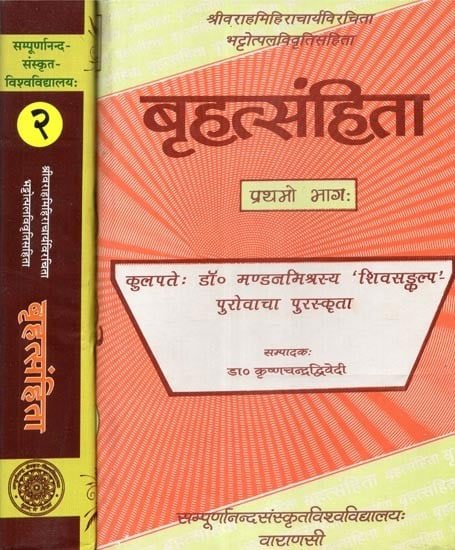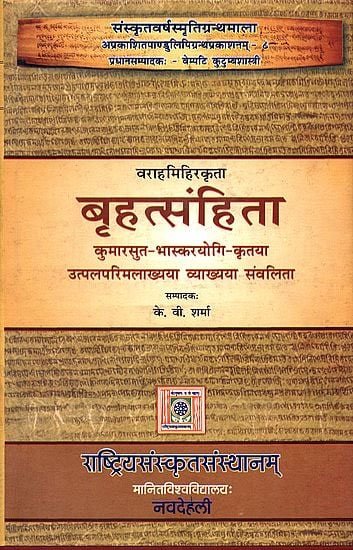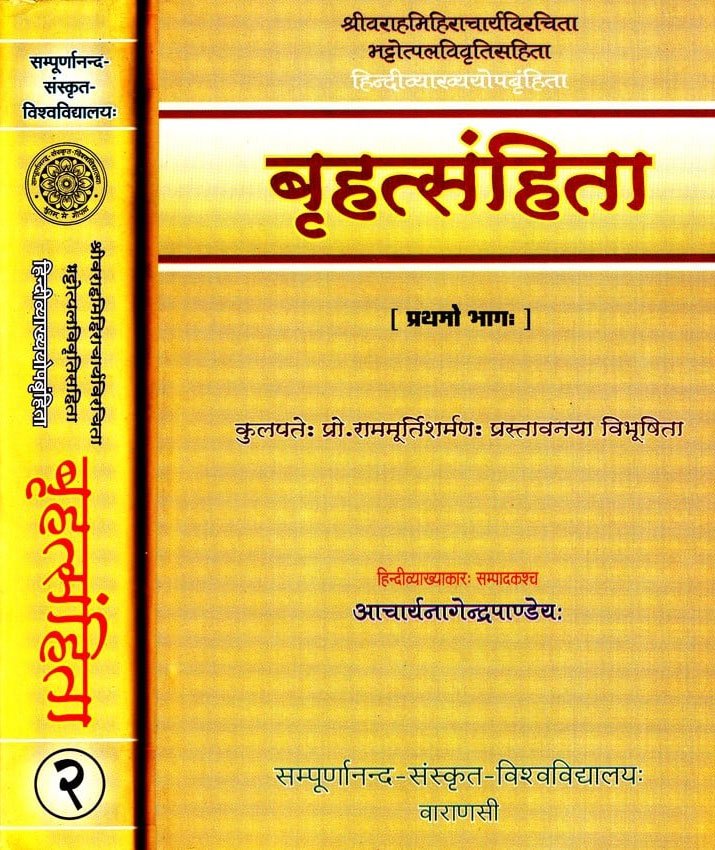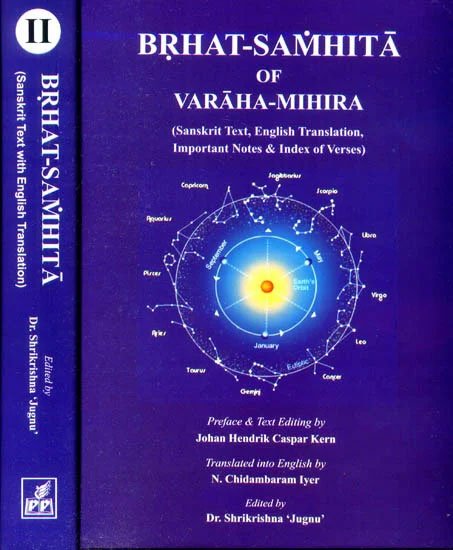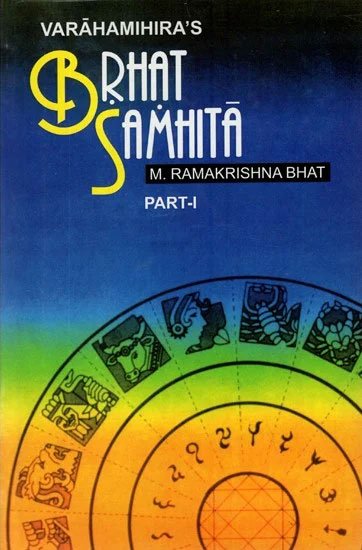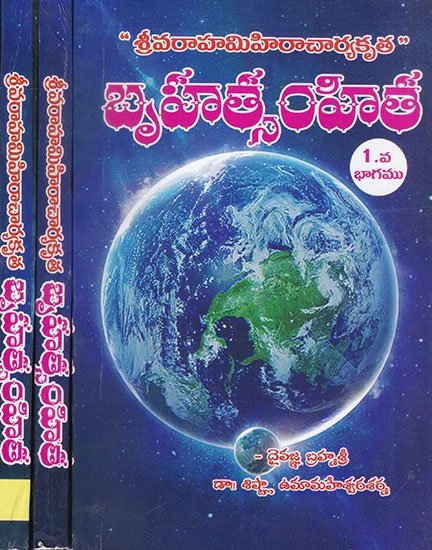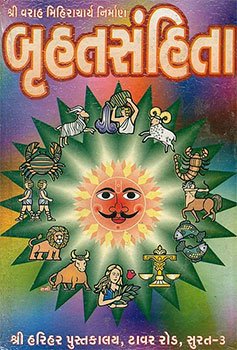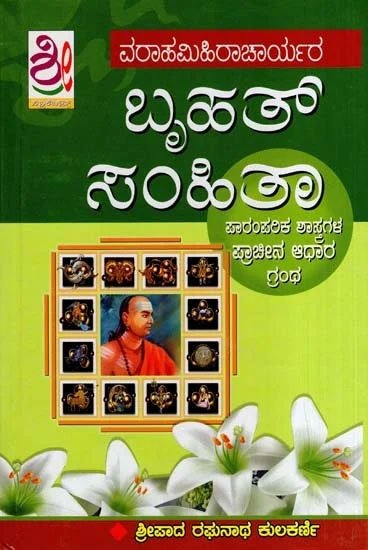Brihat-samhita [sanskrit]
26,560 words
The Sanskrit text of the Brihat-samhita from the 6th-century authored by Varaha Mihira in present-day Ujjain, India. It primarily deals with astrology and astronomy but is presented as an encyclopedia of knowledge.
Verse 86.15
वेश्यावटुदाससमागमः परे शुक्लपुष्पफललब्धिः ।
अत ऊर्ध्वं चित्रकरस्य दर्शनं चित्रवस्त्राप्तिः ॥ १५ ॥
[शुष्क । अतः परं । वस्त्रसम्प्राप्तिः]
veśyāvaṭudāsasamāgamaḥ pare śuklapuṣpaphalalabdhiḥ |
ata ūrdhvaṃ citrakarasya darśanaṃ citravastrāptiḥ || 15 ||
[śuṣka | ataḥ paraṃ | vastrasamprāptiḥ]
The Sanskrit text of Verse 86.15 is contained in the book Brihata Samhita (Sanskrit Text with Hindi Translation) by Pandit Achyutananda Jha. This book is available online or you could buy the latest edition:
Read online Buy now! The Sanskrit text by Pandit Achyutananda Jha (2001)
Glossary of Sanskrit terms
Note: This extracts Sanskrit terms and links to English definitions from the glossary, based on an experimental segmentation of verse (86.15). Some terms could be superfluous while some might not be mentioned. Click on the word to show English definitions.
Veshi, Veshya, Avatu, Dasa, Samagama, Pare, Para, Pari, Shuklapushpa, Phala, Labdhi, Atah, Urdhvam, Urdhva, Citrakara, Darshana, Citra, Vastri, Vastra, Apti, Shushka, Param,
Analysis of Sanskrit grammar
Note: this is an experimental feature and only shows the first possible analysis of the Sanskrit text (Verse 86.15). If the system was successful in segmenting the sentence, you will see of which words it is made up of, generally consisting of Nouns, Pronouns, Verbs, Participles and Indeclinables. Click on the link to show all possible derivations of the word.
- Line 1: “veśyāvaṭudāsasamāgamaḥ pare śuklapuṣpaphalalabdhiḥ ”
- veśyā -
-
veśya (noun, masculine)[compound], [vocative single]veśya (noun, neuter)[compound], [vocative single]√viś -> veśya (participle, masculine)[compound from √viś]√viś -> veśya (participle, neuter)[compound from √viś]√viś -> veśya (participle, masculine)[compound from √viś]√viś -> veśya (participle, neuter)[compound from √viś]√viś -> veśya (absolutive)[absolutive from √viś]√viś -> veśya (absolutive)[absolutive from √viś]veśi (noun, feminine)[instrumental single]veśī (noun, feminine)[instrumental single]veśyā (noun, feminine)[nominative single]√viś -> veśya (participle, masculine)[vocative single from √viś class 6 verb], [vocative single from √viś]√viś -> veśya (participle, neuter)[vocative single from √viś class 6 verb], [vocative single from √viś]√viś -> veśyā (participle, feminine)[nominative single from √viś class 6 verb], [nominative single from √viś]√viś -> veśya (participle, masculine)[vocative single from √viś class 1 verb], [vocative single from √viś]√viś -> veśya (participle, neuter)[vocative single from √viś class 1 verb], [vocative single from √viś]√viś -> veśyā (participle, feminine)[nominative single from √viś class 1 verb], [nominative single from √viś]
- avaṭu -
-
avaṭu (noun, neuter)[compound], [adverb], [nominative single], [vocative single], [accusative single]
- dāsa -
-
dāsa (noun, masculine)[compound], [vocative single]dāsa (noun, neuter)[compound], [vocative single]√dās (verb class 1)[imperative active second single]√das (verb class 1)[imperative active second single]
- samāgamaḥ -
-
samāgama (noun, masculine)[nominative single]
- pare -
-
pare (indeclinable)[indeclinable]para (noun, masculine)[nominative plural], [locative single]para (noun, neuter)[nominative dual], [vocative dual], [accusative dual], [locative single]parā (noun, feminine)[nominative dual], [vocative single], [vocative dual], [accusative dual]pari (noun, masculine)[vocative single]pari (noun, feminine)[vocative single]
- śuklapuṣpa -
-
śuklapuṣpa (noun, masculine)[compound], [vocative single]śuklapuṣpa (noun, neuter)[compound], [vocative single]
- phala -
-
phala (noun, masculine)[compound], [vocative single]phala (noun, neuter)[compound], [vocative single]√phal (verb class 1)[imperative active second single]
- labdhiḥ -
-
labdhi (noun, feminine)[nominative single]
- Line 2: “ata ūrdhvaṃ citrakarasya darśanaṃ citravastrāptiḥ || 15 |”
- ata* -
-
ataḥ (indeclinable)[indeclinable]
- ūrdhvam -
-
ūrdhvam (indeclinable)[indeclinable]ūrdhva (noun, masculine)[adverb], [accusative single]ūrdhva (noun, neuter)[adverb], [nominative single], [accusative single]ūrdhvā (noun, feminine)[adverb]
- citrakarasya -
-
citrakara (noun, masculine)[genitive single]
- darśanam -
-
darśana (noun, masculine)[adverb], [accusative single]darśana (noun, neuter)[adverb], [nominative single], [accusative single]darśanā (noun, feminine)[adverb]
- citra -
-
citra (noun, masculine)[compound], [vocative single]citra (noun, neuter)[compound], [vocative single]
- vastrā -
-
vastṛ (noun, masculine)[compound], [adverb], [instrumental single]vastṛ (noun, neuter)[compound], [adverb], [nominative single], [vocative single], [accusative single]vastra (noun, neuter)[compound], [vocative single]vastrā (noun, feminine)[nominative single]
- āptiḥ -
-
āpti (noun, feminine)[nominative single]
- Cannot analyse 15
- Line 3: “[śuṣka | ataḥ paraṃ ”
- śuṣka -
-
śuṣka (noun, masculine)[compound], [vocative single]śuṣka (noun, neuter)[compound], [vocative single]√śuṣ -> śuṣka (participle, masculine)[vocative single from √śuṣ class 4 verb], [vocative single from √śuṣ class 6 verb]√śuṣ -> śuṣka (participle, neuter)[vocative single from √śuṣ class 4 verb], [vocative single from √śuṣ class 6 verb]
- ataḥ -
-
ataḥ (indeclinable)[indeclinable]
- param -
-
param (indeclinable)[indeclinable]para (noun, masculine)[adverb], [accusative single]para (noun, neuter)[nominative single], [accusative single]
Other editions:
Also see the following editions of the Sanskrit text or (alternative) English translations of the Verse 86.15
Brhatsamhita with the Commentary of Bhattotpala
by Krishna Chandra Dwivedi (2016)
Publisher: Sampurnanand Sanskrit University; 1229 pages;
Buy now!
Brihat Samhita with the Commentary of Utpalapatimala of Yogisvara
by K. V. Sharma (2012)
Publisher: Rashtriya Sanskrit Sansthan, Janakpuri; 754 pages; ISBN-10; 8186111360; ISBN-13: 9788186111369
Buy now!
Brihat Samhita (Hindi Translation)
by K. V. Sharma (2002)
Publisher: Sampurnanand Sanskrit University; 2359 pages; ISBN-13: 9789387890008.
Buy now!
Brhat Samhita (English translation)
by N. Chidambaram Iyer (2022)
Publisher: Parimal Publication Pvt. Ltd.; 801 pages; Edited by Dr. Shrikrishna Jugnu; ISBN-10: 8171104215; ISBN-13: 9788171104215.
Buy now!
Brhat Samhita (English with notes)
by M. Ramakrishna Bhat (2010)
Publisher: Motilal Banarsidas Publishers Pvt. Ltd.; 1155 pages; ISBN-10: 8120810600; ISBN-13: 9788120810600.
Buy now!
Brhat Samhita (Telugu translation)
by Sishtla Umamaheswara Sharma (2020)
Publisher: Mohan Publications, Andhra Pradesh; 846 pages.
Buy now!Preview of verse 86.15 in Kannada sript:
ವೇಶ್ಯಾವಟುದಾಸಸಮಾಗಮಃ ಪರೇ ಶುಕ್ಲಪುಷ್ಪಫಲಲಬ್ಧಿಃ ।
ಅತ ಊರ್ಧ್ವಂ ಚಿತ್ರಕರಸ್ಯ ದರ್ಶನಂ ಚಿತ್ರವಸ್ತ್ರಾಪ್ತಿಃ ॥ ೧೫ ॥
[ಶುಷ್ಕ । ಅತಃ ಪರಂ । ವಸ್ತ್ರಸಮ್ಪ್ರಾಪ್ತಿಃ]
Brhat Samhita (Gujarati translation)
by - (2000)
Publisher: Shree Harihar Pustakalay, Surat; Author: Shri Varahamihira Acharya (શ્રી વરાહમિહીરાચાર્ય); 432 pages.
Buy now!Preview of verse 86.15 in Gujarati sript:
વેશ્યાવટુદાસસમાગમઃ પરે શુક્લપુષ્પફલલબ્ધિઃ ।
અત ઊર્ધ્વં ચિત્રકરસ્ય દર્શનં ચિત્રવસ્ત્રાપ્તિઃ ॥ ૧૫ ॥
[શુષ્ક । અતઃ પરં । વસ્ત્રસમ્પ્રાપ્તિઃ]
Brhat Samhita (Kannada translation)
by Sripada Raghunatha Kulkarni (2021)
Publisher: Srinidhi Publications, Bangalore; 668 pages with illustrations.
Buy now!Preview of verse 86.15 in Kannada sript:
ವೇಶ್ಯಾವಟುದಾಸಸಮಾಗಮಃ ಪರೇ ಶುಕ್ಲಪುಷ್ಪಫಲಲಬ್ಧಿಃ ।
ಅತ ಊರ್ಧ್ವಂ ಚಿತ್ರಕರಸ್ಯ ದರ್ಶನಂ ಚಿತ್ರವಸ್ತ್ರಾಪ್ತಿಃ ॥ ೧೫ ॥
[ಶುಷ್ಕ । ಅತಃ ಪರಂ । ವಸ್ತ್ರಸಮ್ಪ್ರಾಪ್ತಿಃ]
![Brihat-samhita [sanskrit] - book cover](/uploads/a/Brihat-Samhita-Sanskrit.jpg)
